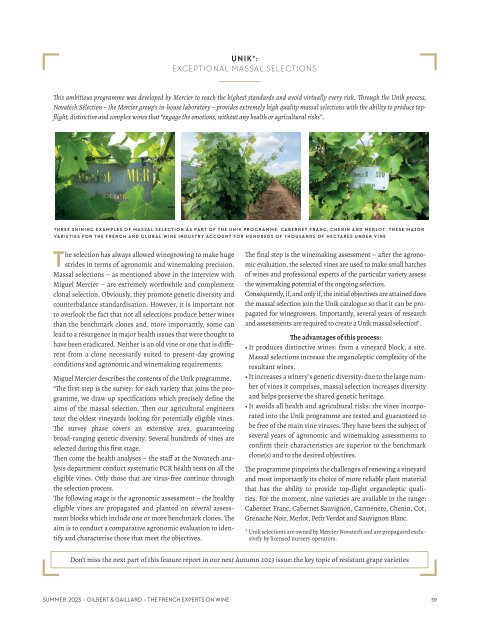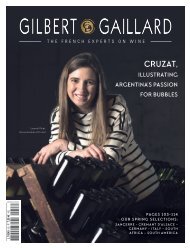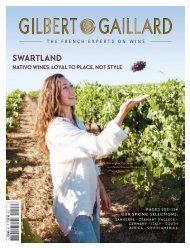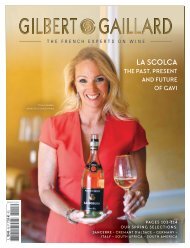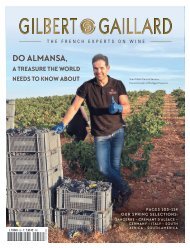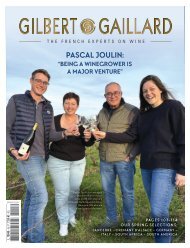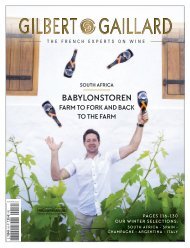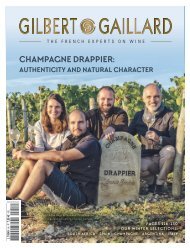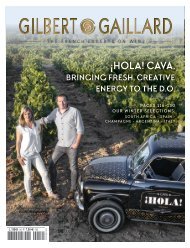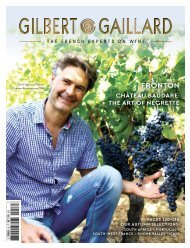Sie wollen auch ein ePaper? Erhöhen Sie die Reichweite Ihrer Titel.
YUMPU macht aus Druck-PDFs automatisch weboptimierte ePaper, die Google liebt.
UNIK*:<br />
EXCEPTIONAL MASSAL SELECTIONS<br />
This ambitious programme was developed by Mercier to reach the highest standards and avoid virtually every risk. Through the Unik process,<br />
Novatech Sélection – the Mercier group’s in-house laboratory – provides extremely high quality massal selections with the ability to produce topflight,<br />
distinctive and complex wines that “engage the emotions, without any health or agricultural risks”.<br />
THREE SHINING EXAMPLES OF MASSAL SELECTION AS PART OF THE UNIK PROGRAMME: CABERNET <strong>FR</strong>ANC, CHENIN AND MERLOT. THESE MAJOR<br />
VARIETIES FOR THE <strong>FR</strong>ENCH AND GLOBAL WINE INDUSTRY ACCOUNT FOR HUNDREDS OF THOUSANDS OF HECTARES UNDER VINE<br />
The selection has always allowed winegrowing to make huge<br />
strides in terms of agronomic and winemaking precision.<br />
Massal selections – as mentioned above in the interview with<br />
Miguel Mercier – are extremely worthwhile and complement<br />
clonal selection. Obviously, they promote genetic diversity and<br />
counterbalance standardisation. However, it is important not<br />
to overlook the fact that not all selections produce better wines<br />
than the benchmark clones and, more importantly, some can<br />
lead to a resurgence in major health issues that were thought to<br />
have been eradicated. Neither is an old vine or one that is different<br />
from a clone necessarily suited to present-day growing<br />
conditions and agronomic and winemaking requirements.<br />
Miguel Mercier describes the contents of the Unik programme.<br />
“The first step is the survey: for each variety that joins the programme,<br />
we draw up specifications which precisely define the<br />
aims of the massal selection. Then our agricultural engineers<br />
tour the oldest vineyards looking for potentially eligible vines.<br />
The survey phase covers an extensive area, guaranteeing<br />
broad-ranging genetic diversity. Several hundreds of vines are<br />
selected during this first stage.<br />
Then come the health analyses – the staff at the Novatech analysis<br />
department conduct systematic PCR health tests on all the<br />
eligible vines. Only those that are virus-free continue through<br />
the selection process.<br />
The following stage is the agronomic assessment – the healthy<br />
eligible vines are propagated and planted on several assessment<br />
blocks which include one or more benchmark clones. The<br />
aim is to conduct a comparative agronomic evaluation to identify<br />
and characterise those that meet the objectives.<br />
The final step is the winemaking assessment – after the agronomic<br />
evaluation, the selected vines are used to make small batches<br />
of wines and professional experts of the particular variety assess<br />
the winemaking potential of the ongoing selection.<br />
Consequently, if, and only if, the initial objectives are attained does<br />
the massal selection join the Unik catalogue so that it can be propagated<br />
for winegrowers. Importantly, several years of research<br />
and assessments are required to create a Unik massal selection”.<br />
The advantages of this process:<br />
• It produces distinctive wines: from a vineyard block, a site.<br />
Massal selections increase the organoleptic complexity of the<br />
resultant wines.<br />
• It increases a winery’s genetic diversity: due to the large number<br />
of vines it comprises, massal selection increases diversity<br />
and helps preserve the shared genetic heritage.<br />
• It avoids all health and agricultural risks: the vines incorporated<br />
into the Unik programme are tested and guaranteed to<br />
be free of the main vine viruses. They have been the subject of<br />
several years of agronomic and winemaking assessments to<br />
confirm their characteristics are superior to the benchmark<br />
clone(s) and to the desired objectives.<br />
The programme pinpoints the challenges of renewing a vineyard<br />
and most importantly its choice of more reliable plant material<br />
that has the ability to provide top-flight organoleptic qualities.<br />
For the moment, nine varieties are available in the range:<br />
Cabernet Franc, Cabernet Sauvignon, Carménère, Chenin, Cot,<br />
Grenache Noir, Merlot, Petit Verdot and Sauvignon Blanc.<br />
* Unik selections are owned by Mercier Novatech and are propagated exclusively<br />
by licensed nursery operators.<br />
Don’t miss the next part of this feature report in our next Autumn 2023 issue: the key topic of resistant grape varieties<br />
SUMMER 2023 • GILBERT & GAILLARD - THE <strong>FR</strong>ENCH EXPERTS ON WINE<br />
59


